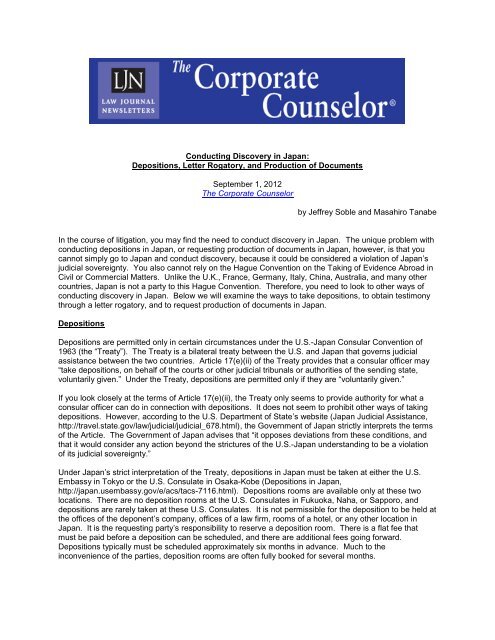The Impact of Technology on the Efficiency of Letters Rogatory Processes
The Impact of Technology on the Efficiency of Letters Rogatory Processes
Blog Article
Letters Rogatory Explained: Facilitating Legal Collaboration In Between Countries

Definition of Letters Rogatory
Letters rogatory are official demands made by a court in one territory to a court in an additional territory, looking for aid in acquiring evidence or testament for a legal case. This procedural mechanism is important in the context of worldwide law, where lawful systems might vary, and cross-border teamwork is essential. Letters rogatory promote the event of details that may be important for adjudicating cases, particularly in circumstances including complicated global problems.
Normally, these demands occur in civil, criminal, or management matters where a celebration calls for proof that lies outside the territory of the requesting court. The letters offer as a way to make sure that the principles of due procedure are promoted, making it possible for courts to accessibility evidence that may or else continue to be inaccessible due to lawful or geographic obstacles.
Making use of letters rogatory is governed by worldwide treaties, reciprocal arrangements, or domestic laws, which define the procedures and obligations of the courts entailed. It is essential to keep in mind that the implementation of such demands is not ensured; they depend on the legislations and techniques of the jurisdiction obtaining the letter. Hence, letters rogatory are a critical tool for fostering lawful participation and ensuring justice throughout borders.
The Refine of Issuing Letters Rogatory
Issuing letters rogatory includes an organized procedure that guarantees compliance with both global and domestic lawful standards. The asking for event, usually a court or lawful authority, drafts a formal request outlining the nature of the help looked for, the proof or information required, and the legal basis for the demand. This document has to be precise to promote understanding by the foreign territory.

The next step entails sending the letters rogatory to the assigned international authority. This is frequently done with polite channels or global legal aid frameworks, making sure that the demand is received and recognized by the foreign court. The international court then processes the demand according to its own lawful procedures, eventually responding to the asking for party with the popular info or evidence, thus helping with global legal participation.
Value in International Regulation
The value of letters rogatory in international regulation can not be overstated, as they function as an essential mechanism for judicial collaboration throughout boundaries. These formal demands for support in legal matters enable courts in one territory to seek details, evidence, or the presence of witnesses from another territory, thereby assisting in the administration of justice in global instances.
Letters rogatory are particularly crucial in the context of globalization, where legal conflicts often cover several nations. They enable the collection of evidence that could or else be inaccessible, guaranteeing that legal process are notified and reasonable. By cultivating partnership in between judicial systems, letters rogatory assistance copyright the policy of legislation and advertise common respect amongst nations.
In addition, using letters rogatory demonstrates a dedication to international standards and principles of cooperation, reflecting the interconnected nature of modern-day lawful practices. It shows the significance of sticking to well established treatments and treaties, such as the Hague Convention, which gives a structure for these requests - Letters rogatory. Inevitably, letters rogatory improve the efficiency of lawful procedures, making certain explanation that justice is not prevented by geographical boundaries
Difficulties and Limitations
Despite their importance, letters rogatory face several challenges and limitations that can hamper their effectiveness. One primary issue is the differing lawful structures and procedures across territories, which can result in misunderstandings and delays in the execution of requests. Different nations might have unique needs for the validity of letters rogatory, complicating the procedure even more.
Additionally, the frequently protracted nature of international lawful cooperation can impede timely access to evidence or witnesses. This hold-up may adversely affect legal proceedings or continuous investigations, particularly in instances requiring urgent action. The lack of sources and training in some jurisdictions can result in inadequate handling of demands, leading to incomplete or inadequate actions.
Social distinctions and varying attitudes in the direction of legal processes can likewise position significant barriers. Countries with less official legal systems might have a hard time to comply with the procedural rigor anticipated in letters rogatory. Last but not least, political stress in between nations can affect the desire to implement requests, causing an absence of teamwork and reducing the energy of this system in international legislation. These challenges demand constant dialogue and reform to improve the effectiveness of letters rogatory in lawful collaboration.
Case Studies and Instances

Conversely, challenges can occur, as seen in a case involving a European nation looking for evidence in a continuous criminal matter from a non-EU country - Letters rogatory. The process was postponed due to bureaucratic obstacles and differing legal criteria, eventually impeding the investigation
These examples highlight that while letters rogatory can promote global cooperation and quicken lawful proceedings, they likewise highlight the requirement for clear interaction webpage and understanding of company website lawful structures between nations. Such study underscore the importance of refining this device to enhance effectiveness and performance in international lawful matters.
Conclusion
In summary, letters rogatory serve as a vital device for assisting in legal cooperation in between nations, guaranteeing the collection of evidence and testament across jurisdictions. Their value in worldwide law can not be overemphasized, as they advertise due process and boost the effectiveness of cross-border legal process.
Letters rogatory are formal demands made by a court in one territory to a court in another territory, seeking aid in acquiring proof or testament for a lawful proceeding. The asking for party, commonly a court or lawful authority, drafts an official demand outlining the nature of the aid sought, the proof or info required, and the legal basis for the demand. The foreign court then refines the request according to its very own legal procedures, inevitably responding to the asking for party with the desired information or proof, thus assisting in international lawful cooperation.
Additionally, the usage of letters rogatory demonstrates a dedication to international norms and concepts of participation, showing the interconnected nature of modern-day legal practices.Worldwide lawful cooperation with letters rogatory is not without its real-world effects, as illustrated by various instance studies that highlight both successes and challenges.
Report this page